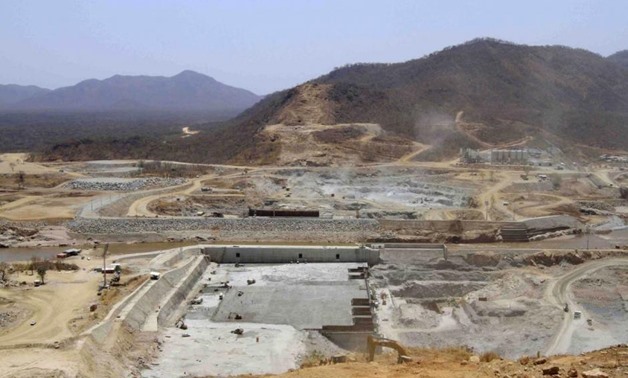
FILE- A general view shows construction activity on the Grand Renaissance dam in Guba Woreda, Benishangul Gumuz region in this March 16, 2014 file photo. REUTERS/Tiksa Negeri/Files
CAIRO - 22 December 2019: The irrigation ministers of Egypt, Sudan, and Ethiopia resumed negotiations onthe Renaissance Dam for the second day in Khartoum, with the participation of representatives from the World Bank and the United States as observers to the meetings.
The ministersdiscussedthe sticking points of the technical elements governing filling and operating the dam, as well as dealing with droughtsand refilling. This is in addition to the coordination mechanism between the three countries.
This meeting is a continuation of the meeting held in November in Addis Ababa, Ethiopia and the meeting held in Cairo in December.
Egypt's Minister of Irrigation Mohamed Abdel Aty expressed hope that progress will be achieved, underlining that Egypt has shown leniency in talks. “We are halfway through the negotiation process after the meeting of the three states’ foreign ministers in Washington on November 6,” the minister said. In that meeting, the three states agreed to hold four technical meetings to follow up on the progress of negotiations.
The minister highlighted the outcomes of the two meetings that took place in Addis Ababa and Cairo to exchange views on the rules of filling the reservoir and operating the dam. “In the meetings, parties spotted the points of difference and points of potential agreement,” the minister stated.
“We expect from other parties to listen to our views on the rules of filling the reservoir. The rules have to be integrated and we are ready to hold frank talks,” the minister asserted.
Sudanese Minister of Water Resources and Irrigation Yasser Abbas affirmed the necessity to achieve fair use of Nile water inEgypt, Sudan and Ethiopia. The minister stressed his country’s eagerness to abide by the principles of international water law to not harm other Nile Basin countries.
“The Nile River is the source of life for Egypt. Egypt needs Nile water. So does Sudan. We assert our rights in the Nile water,” Abbas said. “There is enough of Nile water to be used in a rational and cooperative way,” the minister added. “We held many negotiation rounds in the past years. In this meeting, I hope to hold direct discussions over main issues pertinent to filling the reservoir, water flow in times of drought, and coordination mechanisms among parties,” the minister stipulated.
The time-frame for filling and operating the dam is one of the main obstacles in the negotiations. The three countries have tabled different proposals on the duration of filling the GERD's reservoir. Egypt's proposal calls for a relatively extended filling period.
Ethiopia launched the GERD project in 2011 in a bid to provide electricity to more than half of its population and to become the continent's biggest power exporter, generating more than 6,000 megawatts.
Egypt, however, fears that the speed of filling the Ethiopian dam will adversely diminish its share of the River Nile water, as the country depends on the river for 85 percent of its water resources.

Comments
Leave a Comment